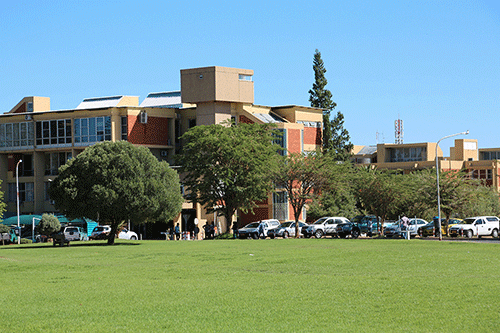The University of Namibia’s recent decision to ban political activities on its premises has been labelled as contradictory and troublesome.
These complaints have come after an internal directive from the university’s pro-vice chancellor for finance, administration, and resource mobilisation (PVC), Ellen Namhila to all campuses to ban political activities on the premises.
In an internal memorandum seen by New Era, Namhila said “recent developments have highlighted the encroachment of political activities onto the campuses and within the faculties.” “While we respect the rights of our students to engage in political discourse, it is essential to safeguard the non-political nature of our academic environment,” she said. Namhila urged those in charge of student affairs to take proactive measures to ensure the facilities
and venues are not used for political
campaigns, recruitments or other activities.
“I encourage close collaboration with student leaders to reinforce our commitment to maintaining an apolitical atmosphere within our university,” Namhila stated.
The university’s spokesperson, Simon Namesho, confirmed the legitimacy of this letter, and said internal communications are still ongoing. He was, however, unable to provide further comment on the matter.
Some academics found the communique distasteful, prompting them to respond with a letter to Namhila, expressing their dissatisfaction with the directive.
On Friday, a group of “concerned academics”, who did not mention their names due to fear of intimidation and/or harassment, said the university’s decision is against the constitution, which grants all citizens, including students and academics, the right to peaceful political activities. “This right is fundamental, and cannot be diminished by any subordinate legislation, let alone a PVC via uninformed directives,” they told her.
The document further reads, “Even before your tenure as PVC, the university had allowed political activities through organised and duly-registered student societies and activities in terms of the provisions of the SRC constitution.”
The academics questioned why such student societies are registered if they can’t fulfil their mandates which are to recruit, promote, mobilise, and engage in activities furthering the interests and ideologies of political parties.
The disheartened academics also told Namhila they offer bachelors, masters and PhDs in political studies, in which aspects of political actions, political campaigns, political behaviour and political ideologies are all covered in the curriculum.
“Our students are expected to practice and have regard for the real world of politics, including campus and student politics and political activities,” they indicated.
The group then asked Namhila to refrain from “turning a once-prestigious university into a Mickey Mouse institution that glorifies and embraces intellectual docility.”
Namesho confirmed the letter was sent to Namhila.
However, the recipient didn’t respond to questions sent to her yesterday.
Prohibited
One of the student societies, the Affirmative Repositioning (AR) Students’ Command, recently fell victim to the directive, as they were denied the opportunity to host their official opening on campus.
“It is a surprise to us and the majority of the students and lecturers,” said the chairperson of the society, Onesmus Iiyambo.
According to him, the assistant director for student services and residences Lazarus Shatipamba informed him that the venue
they booked was no longer available, and asked them to make alternative arrangements to host their event somewhere off the university premises.
Iiyambo sees this as intimidation and harassment tactics by some of the university’s functionaries. He further condemned Namhila’s directive. “All registered societies at the university should be allowed to carry out their activities with zero inches of harassment from the university’s authorities,” he said.
Iiyambo called on other student leaders to shun the university’s orders, calling them undemocratic.
“The ARSC will fight these militaristic conduct by the university with outmost vigour and determination,” he added.
Commentators
“A university is an institution of ideas, and
that is what makes it unique because it generates all kinds of ideas, including political ideas,” said an analyst.
This analyst, who also asked for anonymity for fear of reprisal, sees this move by the university as “troublesome.”
“It puts at risk those of us who comment on political issues, and the students who are participating in students’ activities as youth leaders. Here, you have a university that has a department for political science, but you say that political activities must be banned.
Isn’t it a contradiction?” the analyst
questioned.
“It has been the norm that political party youth wings are allowed to conduct activities on campus if they are duly-registered as societies under the SRC for culture,” said PDM MP Maximalliant Katjimune, adding that it’s surprising that Unam is now taking this stance.
He claimed the university only reacts when it’s certain opposition youth wings who have activities on campus, but never does anything when it comes to the Swapo Party Youth League conducting similar activities.
“The management of Unam must be politically neutral, and leave their alleged Swapo affiliations at their homes and at Swapo rallies. Unam is for everyone,” said the young leader.
Sharing a similar opinion as the analyst and Katjimune, Landless People’s Movement Youth Command leader Duminga Ndala
sees the directive as “pathetic.”
“They want to suppress the students’ political rights on campus. The university should be reminded that it is supposed to mould political leaders and a political
culture within society, but taking such a decision goes against the constitutional
rights of students,” said Ndala.
The youth leader said the university is “trying to create zombie students, as opposed to students who can think for themselves and participate in political discourse and activities.”
Ndala observed that for the past five years, many activities at Unam have been “docile” due to the perceived bureaucratic process that they have put in place.
“For one to have a political seminar or lecture, you have to go through a lengthy process that goes up to the vice chancellor himself to approve,” the youth expressed.


